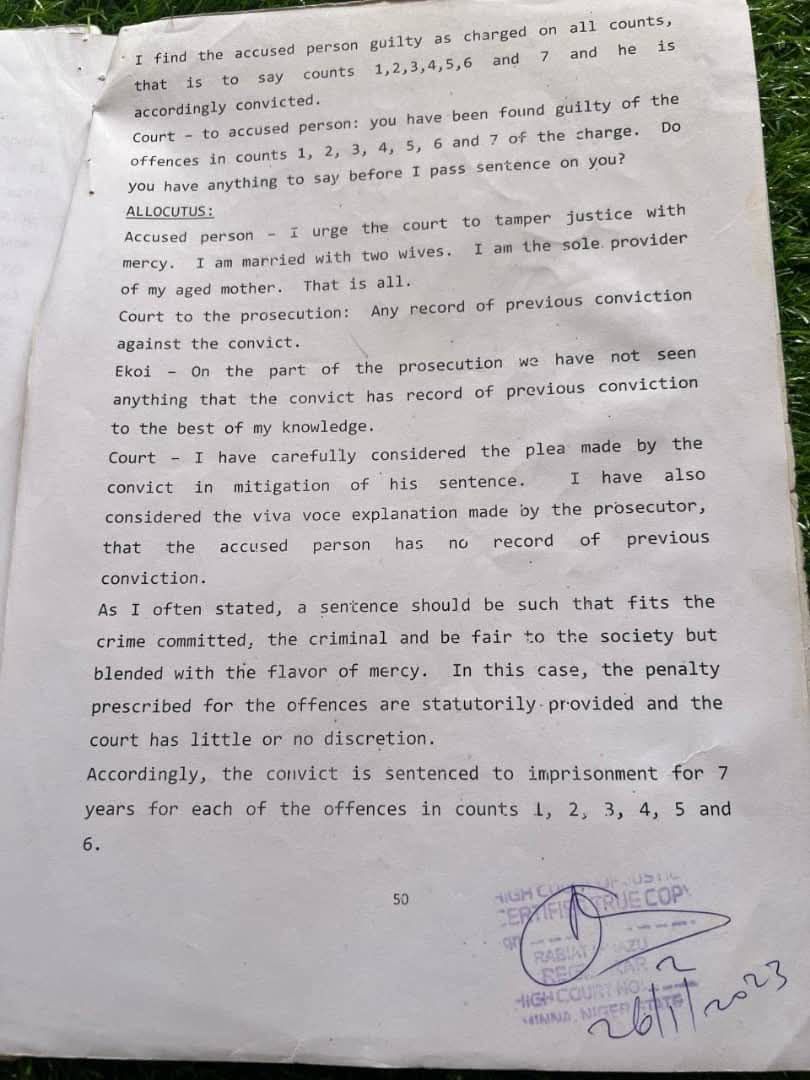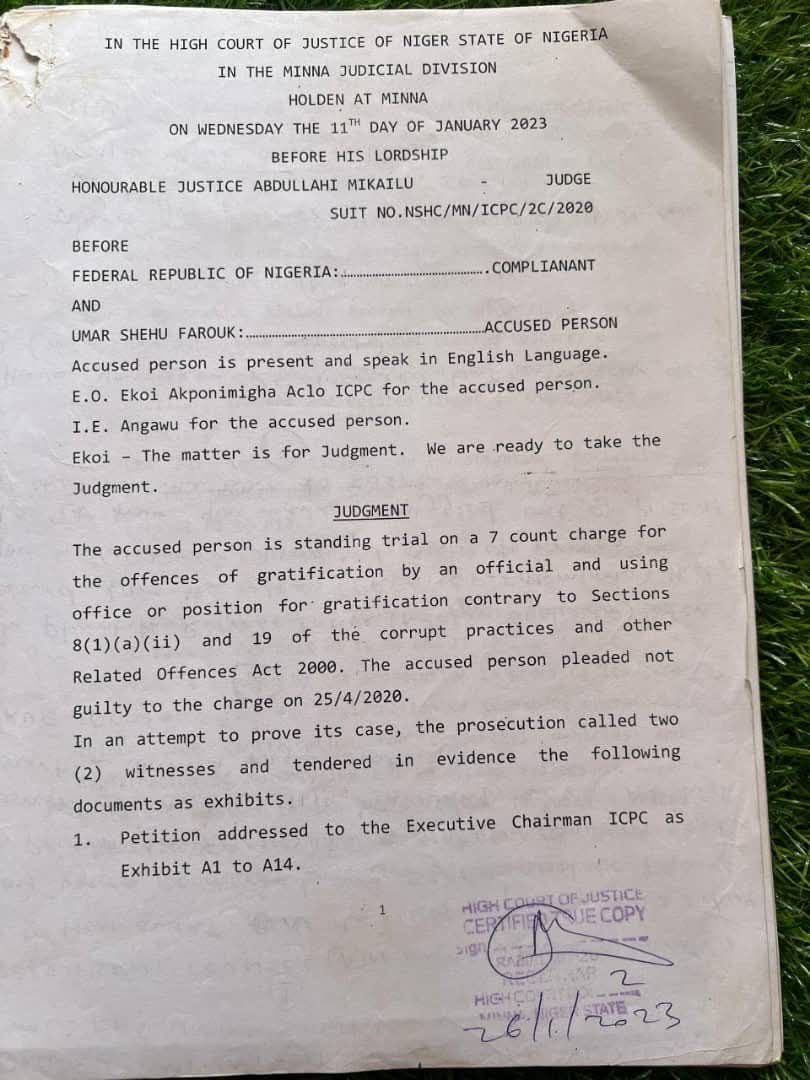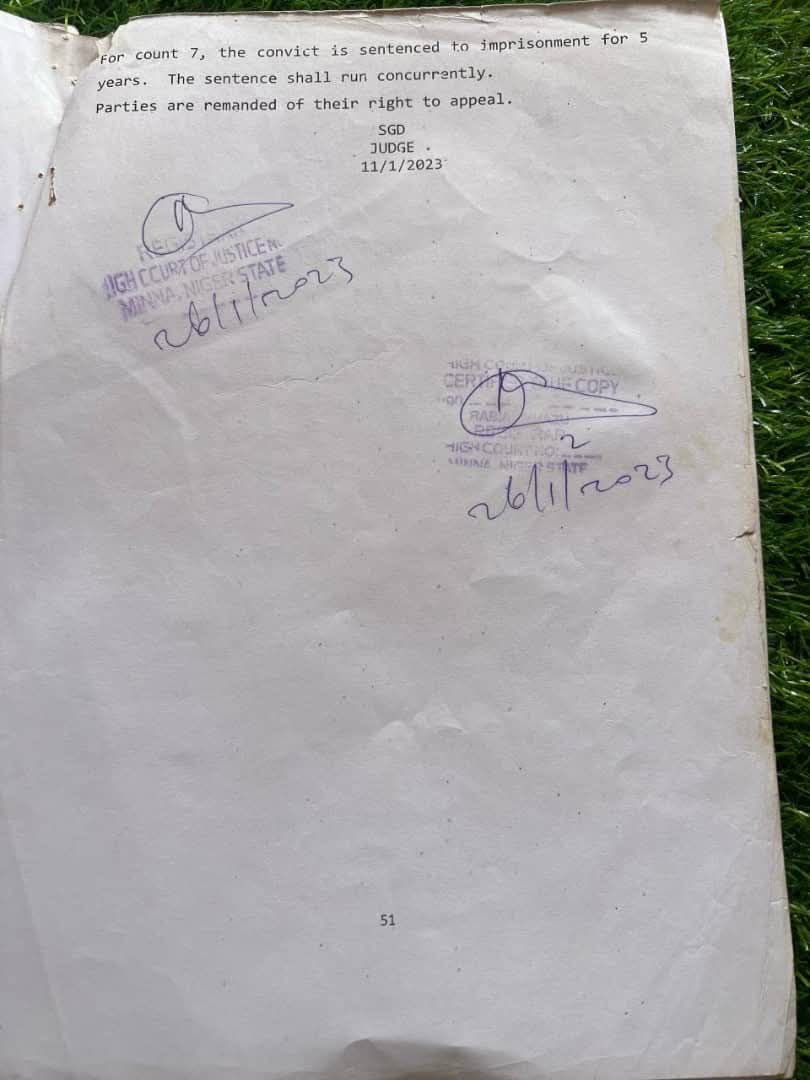News
Convicted Niger State Civil Servant Reinstated and Paid Full Salary While Serving Prison Term for Bribery

 A civil servant in Niger State who was convicted and sentenced to seven years in prison for bribery has been controversially reinstated to his government position just two weeks after his conviction. According to an exclusive report by Sahara Reporters, the individual, whose name has not yet been officially disclosed, was not only reinstated but has also continued to receive his full salary while serving his prison sentence.The development has sparked widespread outrage among civil society groups, legal experts, and the general public, who have described the action as a gross abuse of public office and a mockery of the judicial process. Sources within the Niger State civil service confirmed that the convicted officer resumed receiving monthly salary payments while still incarcerated, raising serious questions about accountability, due process, and the integrity of the state bureaucracy.The civil servant had been found guilty by a competent court and sentenced to seven years imprisonment without an option of fine. The charges were related to a bribery case in which the officer demanded and received illicit financial gratification in the course of carrying out official duties. The conviction was seen at the time as a rare example of justice being served in a country where public sector corruption often goes unpunished.However, the situation took a dramatic turn less than a month after the sentencing when the convict was quietly reinstated by the state government. Internal sources allege that the reinstatement was facilitated by senior officials within the Niger State Civil Service Commission, possibly under political pressure. These sources also claim that the convict was added back to the payroll almost immediately after his reinstatement, with no objection raised by the relevant administrative departments.According to Sahara Reporters, multiple attempts to obtain official statements from the Niger State government have so far been unsuccessful. Top officials have reportedly declined to comment on the matter or have simply stated they are “looking into it.” Efforts to reach the Civil Service Commission for clarification were also unsuccessful as calls and messages went unanswered.Legal practitioners and anti-corruption advocates have described the development as a blatant subversion of justice. They argue that it undermines the credibility of anti-corruption efforts in Nigeria and sends the wrong message to public officials. Human rights lawyer and activist Femi Falana (SAN) condemned the act, stating that any attempt to reinstate a convicted person into public service is illegal and violates civil service regulations.Civil society organizations, including the Socio-Economic Rights and Accountability Project (SERAP), have called for a full investigation into the incident. In a statement issued on Friday, SERAP urged the Economic and Financial Crimes Commission (EFCC) and the Independent Corrupt Practices and Other Related Offences Commission (ICPC) to take immediate action against all those involved in reinstating and paying a convicted felon.Public reaction on social media has been overwhelmingly negative. Many Nigerians expressed disbelief and anger over the revelation, with some calling for mass protests and others demanding the resignation of the officials responsible. The story has reignited debate over the deep-rooted corruption within Nigeria’s public service and the apparent impunity enjoyed by politically connected individuals.Analysts say the situation reflects a broader issue of weak institutional checks and political interference in the enforcement of anti-corruption laws. According to them, cases like this erode public trust in governance and discourage whistleblowers from coming forward.As the scandal continues to unfold, pressure is mounting on the Niger State government to explain how a convicted individual was reinstated and paid public funds while serving a jail sentence. So far, no action has been taken to reverse the decision or to discipline those who may have facilitated the illegal reinstatement.
A civil servant in Niger State who was convicted and sentenced to seven years in prison for bribery has been controversially reinstated to his government position just two weeks after his conviction. According to an exclusive report by Sahara Reporters, the individual, whose name has not yet been officially disclosed, was not only reinstated but has also continued to receive his full salary while serving his prison sentence.The development has sparked widespread outrage among civil society groups, legal experts, and the general public, who have described the action as a gross abuse of public office and a mockery of the judicial process. Sources within the Niger State civil service confirmed that the convicted officer resumed receiving monthly salary payments while still incarcerated, raising serious questions about accountability, due process, and the integrity of the state bureaucracy.The civil servant had been found guilty by a competent court and sentenced to seven years imprisonment without an option of fine. The charges were related to a bribery case in which the officer demanded and received illicit financial gratification in the course of carrying out official duties. The conviction was seen at the time as a rare example of justice being served in a country where public sector corruption often goes unpunished.However, the situation took a dramatic turn less than a month after the sentencing when the convict was quietly reinstated by the state government. Internal sources allege that the reinstatement was facilitated by senior officials within the Niger State Civil Service Commission, possibly under political pressure. These sources also claim that the convict was added back to the payroll almost immediately after his reinstatement, with no objection raised by the relevant administrative departments.According to Sahara Reporters, multiple attempts to obtain official statements from the Niger State government have so far been unsuccessful. Top officials have reportedly declined to comment on the matter or have simply stated they are “looking into it.” Efforts to reach the Civil Service Commission for clarification were also unsuccessful as calls and messages went unanswered.Legal practitioners and anti-corruption advocates have described the development as a blatant subversion of justice. They argue that it undermines the credibility of anti-corruption efforts in Nigeria and sends the wrong message to public officials. Human rights lawyer and activist Femi Falana (SAN) condemned the act, stating that any attempt to reinstate a convicted person into public service is illegal and violates civil service regulations.Civil society organizations, including the Socio-Economic Rights and Accountability Project (SERAP), have called for a full investigation into the incident. In a statement issued on Friday, SERAP urged the Economic and Financial Crimes Commission (EFCC) and the Independent Corrupt Practices and Other Related Offences Commission (ICPC) to take immediate action against all those involved in reinstating and paying a convicted felon.Public reaction on social media has been overwhelmingly negative. Many Nigerians expressed disbelief and anger over the revelation, with some calling for mass protests and others demanding the resignation of the officials responsible. The story has reignited debate over the deep-rooted corruption within Nigeria’s public service and the apparent impunity enjoyed by politically connected individuals.Analysts say the situation reflects a broader issue of weak institutional checks and political interference in the enforcement of anti-corruption laws. According to them, cases like this erode public trust in governance and discourage whistleblowers from coming forward.As the scandal continues to unfold, pressure is mounting on the Niger State government to explain how a convicted individual was reinstated and paid public funds while serving a jail sentence. So far, no action has been taken to reverse the decision or to discipline those who may have facilitated the illegal reinstatement.

